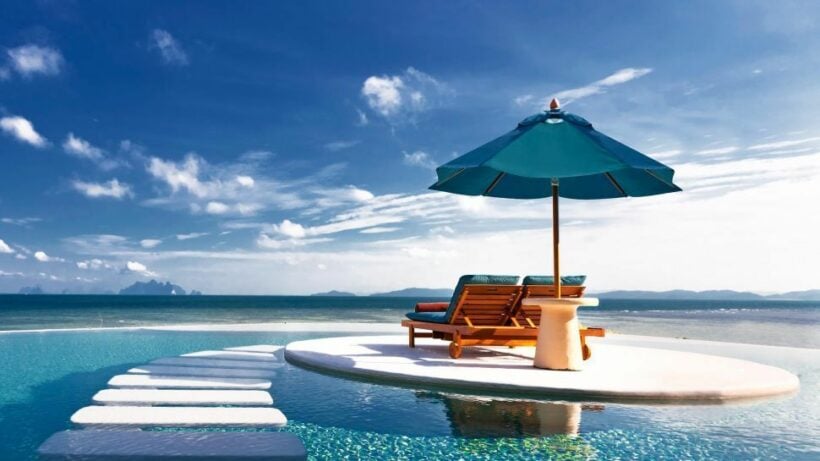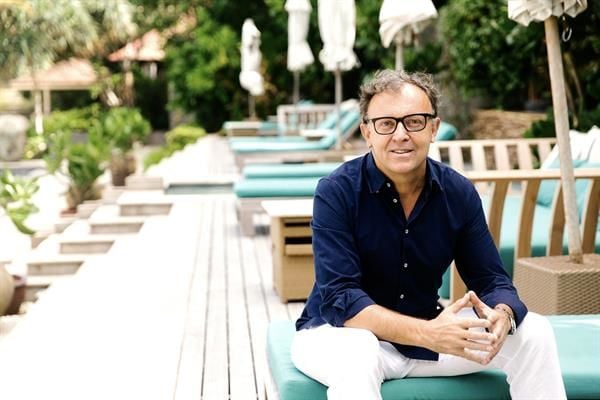What has the pandemic taught hotels about luxury. Is ‘less’ more?

by Anthony Lark
“Let’s say goodbye to all that stale pretence and manufactured pomp”
Until the collective nightmare that was 2020, many of the so-called high-end hotels had a reputation for trying to convince guests to pay for often dingy guestrooms lacking any real views inside an otherwise ornate structure with a storied, celebrated past, where the first impression was a check in often akin to applying for a bank loan. Defined as “luxury”, in the good old days they got away with it.
Over the thirty years I spent running Amanpuri and Trisara on Phuket, I heard hundreds of people complain of feeling ripped off at “legendary” and “iconic” hotels by staff that rudely treated them as anything but guests.
How many of us did not tip the head waiter after dinner on the first night, to return the next evening and find ourselves stashed at a table by the kitchen door, or getting ushered past the prime and utterly empty deck chairs (with a book on them) by an indifferent pool boy rushing to count his bounty at the pool bar.
As we in the hotel business look towards vaccine jabs while collectively praying for people to start travelling again, let’s say goodbye to all that stale pretence and manufactured pomp. Emerging from the darkness that was 2020, we hoteliers need to consider that life will not bounce back to all that, nor should it. Good riddance to the seller’s market when hotels could charge like the light brigade for sub-par accommodations and indifferent service while expecting our guests will automatically keep coming back for more.
Merriam-Webster ‘luxury’ definition #1: a condition of abundance or great ease and comfort.
“There will always be people willing to pay,” said the late, great Natale Rusconi of the Cipriani in Venice and Splendido in Portofino. The size of the room didn’t matter, he observed, nor did the price of a cup of coffee, as long as they felt cocooned in an ‘exclusive’ world with an established reputation of being the “best.”
A classic negroni or a plate of risotto on the terrace at Cipriani is luxurious, not so much because of the ingredients of the food and beverage (although it is the best), but because it’s a rare experience.
Sonu Shivdasani, owner of Soneva resorts, hits it on the head when describing luxury.
He points out “Our external communication focuses much more on our brand proposition of “Inspiring a Lifetime of Rare Experiences”.
For example, we touch upon the point of our guests being able to walk barefoot for a week. This is rare and hence a luxury.
Change is in the luxe-wind
There is definitely change in the post-covid wind. In virtual conversations with many wealthy, well-travelled former guests of mine living in the northern hemisphere, they are explicit about what they yearn for on the other side of their drawn-out lockdowns.
These people are the ones who every year asked me for the largest villa with the bluest views and the most kitted out yacht for a day on the Andaman Sea and now I sense they seek something distinctly less material. While I am not surprised to hear them in their Bel Air mansions and apartments overlooking the River Seine asking for deals, what they say next piques my interest. “Anthony, I don’t need the presidential suite when we come back,” they say without a whiff of disappointment to downgrade. They are increasingly asking not for the specs on yachts but for news of wellness offerings and rare, secret local experiences.
One company already excelling in this beyond luxury space is Six Senses, purchased in 2019 by the behemoth InterContinental Hotels brand but left to run relatively independently under CEO Neil Jacobs. In interviews and on panels throughout the pandemic, Jacobs has spoken often of his personal aversion to the very word ‘luxury’ as well as to ‘exclusivity,’ which he sees in direct opposition to Six Senses’ holistic ethos.
Community engagement, he argues, is not only an aspect of the brand’s sustainability guidelines but also critical to “the intrinsic value of the content around what is being offered” at each individual property.
Like Jacobs, I noticed even before Covid that bragging rights back home no longer focus solely on price-tagged acquisitions. Those same guests who regaled me during lockdown with tales from their past travels, talked about meaningful encounters with Bhutanese textile weavers, Portuguese sourdough bakers, Colombian coffee farmers or Thai fishermen with whom they shared meaningful encounters on immersive, often unexpectedly transformative journeys. Perhaps we all learned in lockdown that these memories endure far longer than we can linger on even the most decadent bed linens or the hotel’s fluffy-as-a-cloud bathrobes.
Even before any of us had given a thought to wet markets in Wuhan, our industry was abuzz with these ‘experiential’ and ‘transformational’ travel offerings, and we see smaller, more nimble independent hotels and resorts luring guests away from staid grand dames of the past, while commanding higher rates.
I suspect we will now enter a new era, best described by Morris Sim, one of the smartest marketing minds I know. Travellers he predicts, will be embracing the idea that “ luxury is the outcome of an experience, not a product.”
Merriam-Webster luxury definition #2: something adding to pleasure or comfort but not absolutely necessary.
To be clear, this is not a rallying cry to spend amidst an economic crisis. Luxurious experiences may be as humble as a thoughtful gesture or act of kindness by a staff member. It’s surprising our guests on their return to the hotel room to find their laundry cleaned, folded and tied with a beautiful bow, or that feeling of being cared for to discover one’s toothpaste, sunscreen and deodorant arranged like tiny soldiers on the bathroom vanity.
Going forward, those hotels that also help guests to make meaningful, immersive connections with the surrounding culture and environment while also delivering unpretentious, anticipatory service with thoughtful human touches will redefine luxury.
Merriam-Webster luxury definition #2b: an indulgence in something that provides pleasure, satisfaction, or ease
Throughout the heady 1990s, we opened a new Amanresort every year or so. While now considered places of beauty that were undeniably desirable, they were initially revolutionary upstarts compared with the most famous resorts of the 70’s and 80’s where gold sink taps stood out against bathrooms laden with Carrera marble.
Into this arena where remote controlled toilets that blew air on your arse were regarded as luxurious, Adrian Zecha’s vision for each Aman was unashamedly simple in design and utterly lacking in superfluous finishing’s. The late architect Ed Tuttle, who mastered this design of understatement used to tell his team (including his lead designer Pin Tan, who now holds that title at Six Senses) and clients that “it’s not about embellishment, it’s about owning the space.” By this he meant that humans are most at ease in spaces that function well when for them rather than for shelter magazines and marketing brochures.
As we look towards leaving hibernation behind, I strongly believe our guests will gravitate to uncluttered places where simplicity reigns, where they can look better and feel better about their emergent selves and where they can enjoy consequential encounters with fascinating strangers, after feeling cut off for so long.
At Trisara Phuket, the team here serves local residents and Bangkokians down for the weekend gourmet Thai-inspired lunches prepared by chefs under a Thai carved sala roof overlooking a charming lake at the resort’s nearby working farm, engaging with locals tending the farm while keeping comfortably cool and exquisitely sated.
My personal view is that successful hotels must throw off any remaining shackles of our industry’s past definitions of ‘luxury’ and pivot towards delivering authentically local guest experiences and anticipative service that surprises and delights.
Are we headed towards a new paradigm where our job is to nurture the “outcome of the experience” rather than the showmanship of counting threads of Egyptian cotton and embroidering initials on pillowslips?

Anthony Lark is the founding and current president of The Phuket Hotels Association. He also runs his own luxury hospitality company focused on resort and residential villa design & master plan concepts, plus management auditing of existing properties as hotels prepare for a post-covid world.
Latest Thailand News
Follow The Thaiger on Google News:


























